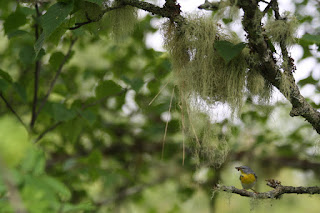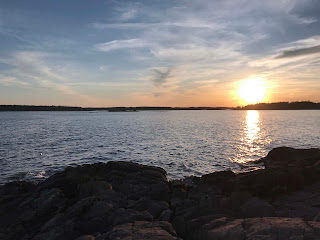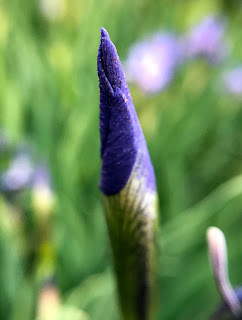July 1 2020
Vinalhaven Land Trust and Maine Coast Heritage Trust supported.
Feel the trust.
Yes Big Al, more plant stuff in this one. It’s that darned lens Amy gave
me!
Highlights – Red-billed Tropicbird, flowers, slime molds, mushrooms, and
other stuff!
Business – Big
shout out to Uncle Gus out in Duarte CA who took care of and cleaned up all the
computer issues I could rustle up – which is a lot! Gus – you are the best!
 |
| as of last week there was one 'white' pink lady slipper (that i saw) at the Huber Preserve. Just before lollipop loop, on the right. |
Tiit Trick –
click on photos to enlarge.
Coronavirus stuff – here’s a link to the Town of Vinalhaven’s website page on Coronavirus.
Updated often!
Hey there – it’s
impressive how respectful and serious the island community is taking this. Please
everyone stay focused about this Covid-thing serious. Even if you are a super
selfish, conspiracy theory lover who doesn’t care about anybody and believes no
lives matter, you still don’t want to be the one who slacks off and spreads it
on the island.
 |
| red-billed tropicbird photo by John Drury |
On the water!
- Looking for a boat trip to get away from it all? Nothing beats a day – or a
chunk of a day – on the water with Captain
John Drury on his boat – Skua. Check out his blog for photos and updates – ‘Sightings
From Skua” - http://sightingsfromskua.blogspot.com/
And then go to www.maineseabirdtours.com to
arrange your trip to Seal Island - an active seabird nesting island - today! Best
pelagic tours this side of the planet –this side being the outside.
 |
| Red-billed tropicbird with Arctic Tern |
Sightings –
and speaking of Seal Island – John took
a recent trip to Seal and returned with stories – and photos – of the Red-billed
Tropicbird! The local legend is back for its 16th (or 17th?)
summer visit to the Gulf of Maine! People have come from all over to see this
bird. A statement on how unusual this Red-billed Tropicbird’s behavior is, and
just how weird twitchers/listers/birders are (complete judgment!). But ‘it
takes all kinds’ and ‘whatever gets you out there’ as we say!
This summer people will probably not
be coming from distances to see the tropicbird – so John has dates open and available
for tours. See the tropicbird, see the
puffins, see the terns – just go and see for yourself!
 |
| where'd they go? redstarts with empty nest syndrone photo with John Drury |
Greens Island
- John also has kept an eye on a
pair of warbler nests in his yard on Greens. The American Redstart nest appears to have been robbed of its nestlings
by local Blue Jays. John’s email with
colorful language concerning the Blue Jays shows the emotional connection that
can grow when watching a nest – or den or whatever. As for the Blue Jays, that’s
part of the deal with them (and crows and corvids in general). They are the
first to sound the alarm call when a predator enters an area, and for that kind
of protection birds have to sacrifice a youngster or two every so often. Mafia
of the bird world, and everyone still says “but they are so smart”. And while I
am not a big corvid fan for other reasons – I don’t judge the nest robbing at
all – I don’t buy the whole intelligence as a reason to like a species. There
are plenty of smart people I don’t like, being smart doesn’t make up for not
being cool. I guess there is some judgment in there…..
 |
| parula with food. lichen nest above photo by John Drury |
Anyway, and I digress. The northern Parula nest appears to be
doing well, and that is great. Made out of Usnea lichen, classic “old man’s
beard lichen’, John sent in this photo of an adult Parula bringing in some
treats for its nestlings. Nice shots John! Thanks for sharing……
 |
| northern blue iris |
Northern Blue Iris – it’s been hard to miss these blue dudes, especially if you’ve strolled
around Lane’s Island the last few weeks, but Northern blue Iris (Iris versicolor) have been and continue to
bloom their little hearts out.
Here’s what John Eastman says about the flowers in his powerful non-fiction
masterpiece “The book of Swamp and Bog’
 “The
spectacular flowers are, more literally than most flowers, exhibitionistic ‘flags’
that capture the attention of pollinating insects. While a single flower stalk
may produce several flowers, the flowers bloom sequentially, not all at once.
Lines called nectar guides adorn the largest, tonguelike part, which consists
of three fused sepals. The three upright parts are the petals, and the curved
structures above the sepals hold the sexual parts. An insect pushing beneath
this curved entrance (actually the female flower) is ‘combed; of pollen as it
enters, and it also brushes against the pollen-bearing anthers. The female
parts face away from the anthers, so the chances of self-pollination are
reduced. The fruit, a three lobed capsule, splits to release the stacked seeds.
These can float on water, thus aiding in dispersal.
“The
spectacular flowers are, more literally than most flowers, exhibitionistic ‘flags’
that capture the attention of pollinating insects. While a single flower stalk
may produce several flowers, the flowers bloom sequentially, not all at once.
Lines called nectar guides adorn the largest, tonguelike part, which consists
of three fused sepals. The three upright parts are the petals, and the curved
structures above the sepals hold the sexual parts. An insect pushing beneath
this curved entrance (actually the female flower) is ‘combed; of pollen as it
enters, and it also brushes against the pollen-bearing anthers. The female
parts face away from the anthers, so the chances of self-pollination are
reduced. The fruit, a three lobed capsule, splits to release the stacked seeds.
These can float on water, thus aiding in dispersal.
Irises rise from thick,
creeping rhizomes that branch and spread. They typically appear in small,
cloning patches, seldom in large, pure stands’
Eastman also mentions a little lore
with the Irises…
‘Irises and rainbows have ancient connections. In Greek mythology, Iris was the
rainbow, a messenger goddess designated to transport women’s souls to the
Elysian fields after death.’
Anyway – I found irises particularly photogenic
the other day. From all angles really.
 |
| last years, last weeks, and next years old capsule, drying flower, and new capsule |
Other flowers….Huber – Bunchberry and Lady
Slipper flowers are largely done and gone, but I’ve come to realize that
the plants themselves don’t die and go away until next spring. They actually
keep living and changing! Who woulda thunked, huh? Here are a few shots of
Bunchberry and Lady Slippers going through the motions, the motions of transitioning from flower to
fruit, or fruit capsule! Take a look – I think they look better, but who am I to
judge. As Amy and my mom would say “and
you think your beard looks good”. (I actually don’t know if my beard looks
good, but it feels good….to me!).
 |
| bunchberry fruits - unripe |
 |
| red mouthed Bolete |
Mushrooms –
been so dry, and lovely this June just finding any mushrooms has been a real
treat. One Amanita (I’m an amanita guy!)
– pictures of which I have managed to lose – 2 boletes, and one russula are my tallies so far. We’ll see what
pops up after the recent rains! The next few weeks hold a lot of potential, a
lot of promise mycologically speaking….
 |
| could have used a view of the pores under this Bolete cap to key out to species. will return and see what it is! What it is..... |
 |
| slugs found 'em! |
 |
| Dye makers polypore |
And this cool Dye Maker’s Polypore popped up along the Huber Trail….
 |
| wolf milk slime |
Slime mold photo gallery – I’m sure we’ll have plenty of time to talk slime molds
over the next few months – I stop for slime molds! Here’s a photo collection of
some recent encounters…..
 |
| red raspberry slime |
 |
| close up of drying Brefeldia maxima slime |
 |
| there are two otter marking spots in the photo. one close, one further up |
Otters – Basin – Local River Otters love to mark up trails, especially when close to where
trails cross water ways. Here are a few shots of where an otter has been
marking up the Wharf Quarry Basin Trails. Tore up a little moss, and then left
a ‘message in a spraint’ as we ‘spraint heads’ like to say.
 |
| torn up moss tossed on trail and then spot sprainted on |
 |
| the spraint |
 |
| chalk fronted Corporal |
 |
| dot tailed whiteface |
15 Minutes at Armbrust Hill – had a few minutes to check out the ‘pond on the hill’ for
Odonatas, and while things seem to be just starting out a few species were
representing well. For dragonflies we
found - Chalk-fronted Corporals & Dot-tailed
Whiteface to be active. For Damselflies – Eastern Forktails, Fragile Forktails, and this pair of mating Bluets.
Bluets are notoriously difficult to identify to species. Not necessarily impossible,
but still. We’ll call this one a Bluet! Actually two bluets!
 |
| eastern forktail |
 |
| fragile forktail |
 |
| mating bluets or Get A Room! |
A few of Leif –
and the painted turtle laying eggs at the end of the road. So cool.
And with Amy and Frankie –
 |
| skipper on the hat! |
Hey – be safe and we’ll see you out
there! Probably at the Lane’s Island parking lot – where friends meet!













